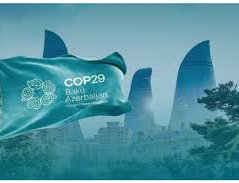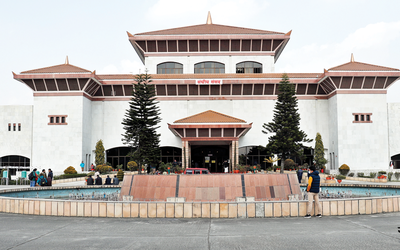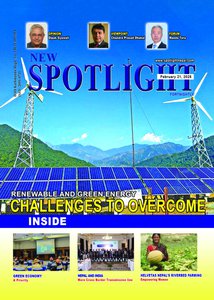
Parties to the UN Framework Convention on Climate Change, Kyoto Protocol and the Paris Agreementmade several decisions at Baku, Azerbaijanto advanceimplementation of their provisions. The 29th session of the Conference of the Parties (CoP29) to the Convention, CMP19 and CMA6wereheld at Bakufrom 11 to 22 November 2024 along with 61st sessions of SBs.Baku CoP29 was tolda 'finance CoP' and was expected, inter alia, to make meaningful decisions on scaling up of finance, advancing carbon trading, accelerating adaptation actions, and agree onambitious GHGs emission reduction targets. Parties took additional 30 hours (from Friday mid-night) to compromise, particularly on finance, and the President closedall sessions at about5:30 am on 24 November 2024.
In this CoP, developing countries urged to mobilise US$ 1.3 trillion under the New Collective Quantified Goal (NCQG) and further urged to allocate at least US$ 600 billion as grants and equivalent resources. Climate vulnerable countries emphasised their top priority to have a minimum allocation floorat least US$ 220 billion a year for Least Developed Countries (LDCs) and US$ 39 billion a year for Small Island Developing States (SIDS) both in grant. Of several decisions, the following can be considered the important milestones at Baku, and would be of interest for Nepal as well:
a.Operationalisation of market-based cooperative approaches (carbon trading) under the Articles 6.2 and 6.4 of the Pais Agreement;
b.Triple public finance to developing countries, from the previous goal of US$ 100 billion annually, to US$ 300 billion annually by 2035;
c.Make efforts to scale-up finance, from public and private sources, to US$ 1.3 trillion per year by 2035;
d.Establishment of a support programme for National Adaptation Plans (NAPs) implementation in LDCs, and translate adaptation plans into tangible outcomes;
e.Launch of the Baku Adaptation Road Map and Baku high-level dialogue on adaptation to enhance implementation of the UAE Framework and setup a clear path for the indicators work programme on the global goal on adaptation at CoP30;
f.Extension of Lima work programme on gender and climate change for another 10 years; and
g.Reemphasis on the critical importance of all stakeholders to engage in climate actions andensure the meaningful participation of children within the Youth-led Climate Forum.
Lack of progress on outcomes of the Global Stocktake, energy transition (phasing out of fossil-fuel), and allocation floors for adaptation and loss and damage made Parties of the LDCs and SIDS disappointed and even walked out temporarily as they did not see their priorities reflected on the working text.These are pledge-based supports. As previous commitment of US$ 100 billion is yet to comply with, let us hope that tripling public finance by 2035 will happen.
Before CoP29, UNEP released two reports on emission and adaptation. The Emissions Gap Report (2024), titled "No more hot air ... please!" informs GHG emissions increase of 1.3 percent from 2022 levels. As per this report, China and India have 5.2% and 6.1% increase in total GHG emissions in 2023 as compared to 2022 while GHG emissions in USA and European Union have declined by 1.4 percent and 7.5 percent respectively in 2023 to 2022 levels. It calls for accelerating mitigation actions with ambitious Nationally Determined Contribution (NDC) to be submitted by February 2025 and implementation of, inter alia, proven, and cost-effective options such as solar and wind energy. This report estimated the need for at least six-fold increase in mitigation investment, and estimated global incremental investment for a net-zero transition @ of US$ 0.9 trillion to US$ 2.1 trillion per year between 2021 and 2050.
The Adaptation Gap Report (2024) informs slow progress in adaptation implementation and calls for additional efforts to address the increasing climate risks. Adaptation financing needs for NDC and NAPsis estimated at US$ 387 billion/year up to 2030 whereas international public finance flows were only US$ 27.5 billion in 2022. The report urges for scaling-up of adaptation finance to trillion US$, enhancing capacity-building and technology transfer to improve the effectiveness of adaptation actions.
Nepal attended Baku climate conference under the leadership of the Rt. Hon'ble President Mr. Ram Chandra Poudel.Reviewing news and twitter updates, Nepal's participation at the Head of the State level in the World Leaders Climate Action Summit drew attention of the international community particularly on the need for preserving the Himalayas for the planet security, need for additional financial and technology support to address loss and damage and climate change impacts, urged to better understand the functional linkages between the Himalayas and seas, called for an integrated approach and broader collaboration among mountainous and coastal countries, reiterated the urgency of protecting the Himalayas to protect the Earth, highlighted the terrible consequences of global warming and climate change to the climate vulnerable communitiesand natural resources, and underlined the importance of climate justice.
Rt. Hon. President reiterated, inter alia, the urgency of addressing climate change impacts in the mountains and urged for mainstreaming mountain issues in climate negotiation at the 'High-Level Dialogue: Advancing the Mountain Agenda and Mainstreaming Mountains and Climate Change within UNFCCC' organised by the Kyrgyz Republic at the sidelines of CoP29. Chairing the high-level event on 'Mountains in Peril: Loss and Damage in the Himalaya', organised by Nepal, Rt. Hon. President emphasised, inter alia, the need for raising unified voice of the mountainous countries at global forums to address climate change impacts in the mountains.
During the side-lines of the Summit, Rt. Hon'ble President held a meeting with the Maldivian counterpart to strengthen bilateral relations and cooperation on regional and multilateral issues; urged to intensify efforts for availing finance and technology support to the LDCs in the meetings of the Heads of Delegation of the LDCs with the UN Secretary-General; and thanked the President of Azerbaijan in a bilateral meeting for organising the CoP29 successfully.
Hon'ble Ain Bahadur Shahi Thakuri, Minister for Forests and Environment who led the Nepalese delegation after the departure of the Rt. Hon. President from Baku drew attention on the importance of mountains and the Himalayas, called for a dedicated space to discuss mountains and climate change in the UNFCCC process to identify gaps, barriers and possible areas of interventions, and underscored the urgent need for 1.50C-aligned climate actions and scaling-up of finance. On the sideline meetings at Baku, Hon'ble Minister: (i) shared the needs for additional supports for climate actions with the Hon'ble Minister for Climate Change of the United Kingdom; (ii) emphasised on collaborative approaches for climate actions with the Hon'ble Minister for Forests, Environment and Climate Change of Bangladesh; (iii) shared national priorities for ambitious climate actions with UK Special Representative on climate; (iv) informed Nepal's priorities on green economy to the Global Environment Director of the World Bank; (v) expressed Nepal's interestsfor technical and financial support and capacity enhancement in areas of renewable energy, sustainable agriculture and climate financewith the chair of the World Green Economy Organisation; (vi) discussed the impacts of climate change on water resources and urgent need for support on water security, nature conservation and environmental protection with the Special Envoy of the UN Secretary-General on water; (vii) discussed with Special Advisor and Assistant Secretary-General at UN to prioritising climate actions in mountain regions and appreciated the UN's role in supporting the LDCs;and (viii) emphasised on the shared commitment to child-responsive climate finance with the CEO of the Save the Children and her global and Asia regional team.
Hon'ble Minister highlighted the adverse effects of climate change and called for regional partnership to address climate change crisis in a high-level Party event of the environment ministers of the Hindu-Kush Himalayan (HKH) region in presence of Rt. Hon'ble Prime Minister of Bhutan. He emphasised the need for promoting climate-resilient economic and infrastructure development with the Director-General of the Asian Development Bank.
Published news also inform that Hon'ble Minister instructed the Nepalese delegation team for a meaningful participation and noted active participation of the team in different agenda items with focus on finance, loss and damage, transparency, carbon trade, capacity building and technology, and mitigation under the coordination of the Joint-Secretaries, and gender and social inclusion at Under-Secretary level.
In severalmeetings, Nepal called for collective actions to address melting Himalayas and rising sea levels. The Mountain Partnership called for advancing the mountain agenda, noting the vulnerability of mountain ecosystems to climate change.
Before attending CoP29, CMP19 and CMA6, the Ministry of Forests and Environment (MoFE) organised a national conference on climate change. Delivering an inaugural statement, Rt. Hon'ble Prime Minister, Mr. K.P. Sharma Oli instructed the Nepalese delegation to actively participate in negotiations at Baku taking note of national priorities. Conference participants discussed on several issues and offered messages to focus on 'no loan to loss and damage', seek support for capacity building and non-economic loss and damage, focus on easy and direct access modality to access Fund for Responding the Loss and Damage, and advocate for inclusion of loss and damage in the NCQG.
As a former participant of CoPs from 2006 to 2016, I consider the following as Baku achievements for future climate actions in Nepal:
a.The Adaptation Fund (AF) has accredited the National Trust for Nature Conservation (NTNC) for 5 years to function as its National Implementing Entity (NIE) on 19 November 2024. Now, NTNC will have direct access to AF and can develop and implement adaptation and resilience projects up to of US$ 10 million per project.NTNC is also the direct access accredited entity for the Green Climate Fund.
b.The Memorandum of Understanding (MoU) between MoFE and Swedish Energy Agency on emissions trading under article 6.2 of the Paris Agreement will open avenues to benefit from carbon trading. Nepal will benefit from GHGs emissions reduction projects to be implemented with Sweden's support, and Sweden to comply with its GHGs emissions reduction commitment. However, it depends upon the nature of projects developed, fund accessed and implemented under this MoU.
c.A multilateral meeting of the representatives of MoFE, Nepali NGO named Local Initiatives for Biodiversity, Research and Development (LI-BIRD) and the AF is expected to speed upaccrediting the LI-BIRD as the NIE of the Fund in near future. This will open avenues to access funds for adaptation and resilience actions.
d.MoFE and WWF Nepal launched two GEF-funded projects titled "Managing Watersheds for Enhanced Resilience of Communities to Climate Change in Nepal (MaWRiN)" of US$ 9 million; and "Building National Capacities of Nepal to Meet Requirements of the Enhanced Transparency Framework of the Paris Agreement (CBIT) of US$ 1.65 million on 12 November 2024. Effective implementation of these projects may enhance adaptive capacity of the local communities, and make watersheds climate resilient, and build country capacity.
e.The LDC Group has nominated Mr. Naresh Sharma to represent 45 LDCs in the Adaptation Fund Board for two years (2025-'26). He will also function as the Chair of its Accreditation Panel for 2025. Mr. Sharma represented the LDC Group for 2015 and 2016 and served as the chair of the Fund Board in 2016. The Asia-Pacific Group nominated Mr. Manjeet Dhakal for the Consultative Group of Experts (CGE). Participation in constituted bodies provide additional opportunities to flag country priorities, access resources and contribute to the global processes.
A sizeable number of Nepali representing the government and non-governmental organisations, including the UN organisations and Bank attended CoP29 as the Party Delegate. The provisional list of registered on-site participants published on 11 November 2024 included Mr. Sunil Bahadur Thapa, Advisor to the Rt. Hon'ble President under Party Overflow category (as noticed to the former UNFCCC focal point last year). Party Overflow badge holders 'are not part of the official delegation or authorised to speak on behalf of the government'.
Baku could not produce 'preferred outcomes on finance' for LDCs. Nepal flagged mountain issues at various levelsas called for Mountain Initiatives in 2009. Above achievements and concerns of the sideline meetings might scale up climate actions in near future if dedicated country-level efforts made timely. As published news did not cover experiences and learnings from climate actions in Nepal shared through side-events at Baku, MoFE may wish to document shared lessons and learnings through side-events by the member(s) of the Nepali delegation.
Taking note of decisions at Baku, Parties may wish to attend next SBs with renewed commitments to support LDCs, make SBs (62 & 63) and CoP30 meaningful to protect the lives and property of the climate vulnerable, and transform Baku 'disappointment' into 'determination' for climate actions in Brazil.

Batu Uprety
Former Joint-Secretary and Chief of Climate Change Management Division, Ministry of Environment (then), and former Team Leader, National Adaptation Plan (NAP) formulation process. E-mail: upretybk@gmail.com
- Teaming up Climate Change Negotiation
- Apr 18, 2025
- Sagarmatha Sambad: Likely Bearing the Fruits
- Mar 27, 2025
- Decadal Experience In Preparing The NDC
- Mar 03, 2025
- Over Five Decades Of Concern On Air Pollution
- Jan 16, 2025
- Damaging The Functional EIA Track
- Dec 22, 2024














